- Original publication date • 18 September 2022
- Update date • 20 September 2022
- Editor • Rick Tucker
- Note • A substantial portion of the content in this article came from an extensive article written by ETwA winker Alan Dean in Winking World 21, October 1972
- Corrections to original text are noted by a line-through red italic text, with corrections following in green text, e.g.: 122 123.
- BBC • British Broadcasting Company
- ETwA • English Tiddlywinks Association
- M/c • Manchester
- MIT • Massachusetts Institute of Technology
- NATwA • North American Tiddlywinks Association
- Soton • Southampton
- TV • television
- TWA • Trans World Airways
- UK • United Kingdom
- ULU • University of London Union
The MIT tiddlywinks team won the NATwA Continentals tournament in February 1972, thereby becoming the NATwA team champions. Shortly thereafter, the MIT championship team decided to challenge Southampton University in England, who were the current ETwA team champions.
After a range of communications between the NATwA and ETwA champions, dates for competitions were established.
The following eight MIT winkers went to England and competed in matches against quite a variety of English tiddlywinks teams during the Spring of 1972:
- Frans Christ, MIT Class of 1972x
(Also identified as “J. Christ” in some publications since his full name is “Johannes Franciscus Christ”.)
(Note that his name is also often given incorrectly as “Franz Christ”) - Peter Copper, originally MIT Class of 1975
- Dave Lockwood, MIT Class of 1974
- Jim Marlin, MIT Class of 1973
- Bill Renke, originally MIT Class of 1973
- Tim Schiller (MIT captain), MIT Class of 1972
- Michael Schwartz (Moishe), MIT Class of 1972
- Craig Schweinhart, MIT Class of 1973
MIT’s win against the Southampton University team made MIT the World Club Tiddlywinks Champions.
MIT won all matches except the one against the North of England all-stars team.
Scheduling and Funding the Tour
a letter arrives from Bill Renke, the recently elected Secretary of the North American Tiddlywinks Association, with the news that MIT, their national champions, may be arriving in England on... March 25th! The MIT winkers had put in a claim to their finance committee for a grant to cover their expenses for a trip over here to play, amongst others, Southampton University for the Club Championship of the World.
Alan Dean, in Winking World 21, October 1972, page 14
I helped train the winning MIT team and also got the funding for them to go to the UK—money that was previously allocated to the SDS (Students for a Democratic Society) but taken away after they started disrupting MIT classes. Not being an MIT student I didn't get to play.
Michael Crick, post on the North American Tiddlywinks Association page on Facebook, 18 September 2022
"[...] A couple years ago somebody wanted to start a tiddly-winks team. They went to the student government. They got the money for it."
(When asked about the latter, Publicist [Peter] Close looked as though he had been hit with a cream pie. "Oh, don't mention that," he said, grinning sheepishly. Why not? "It's embarrassing. Tiddly-winks." What prompted it? "The world championships. In London. Please don't mention it." The team went to London? "Yes." How'd it do? Subdued voice: "They won." How'd they get the money to go? "MIT is very soft shouldered. Get a guy who wants to enter a Ping-Pong tournament in Hong Kong, and Jim Smith will scrape up the money. Get two guys and he'll find a coach.")
John Underwood, "Beating Their Brains Out" article, Sports Illustrated magazine, 26 May 1975
They recently finagled $1800 in student fees to to allow them to go to England, where they winked all over the Southampton team to win the world crown.
The National Observer, week ending 10 June 1972, page 14
Prematch Publicity
The MIT tiddlywinks team is going to England. The dream of every American winker since the game was first brought over here a decade ago became a reality this March 6, when Finboard, in a magnificent display of generosity and altruism, appropriated the neccessary funds to send eight of MIT's finest potters and squoppers across the ocean to challenge the Southampton University team for the world championship. [...]
Southampton is both the holder of the Marchant Trophy, emblematic of the English championship, and the Prince Philip Silver Wink Trophy, symbolic of supremacy throughout the British Isles. [...]
The tour should engender huge amounts of publicity for the game, which, albeit more widely played in England than in the States, is still not exactly on the level of soccer, rugby, or cricket. [...]
There has been little previous contact between the two winking nations, so it is difficult to predict the outcome of the matches.
Fred Shapiro, in article "Winks squad England bound", in The Tech (MIT student newspaper), 21 March 1972, page 12.
The MIT team, which won the North American championship title last month, will test their skill and strategy against Southampton, the British champions.
MIT's team captain, Timothy Schiller, '72, says, "The British have been playing tiddlywinks three times longer t Han we have, but I think we've got a 50-50 chance of winning. If we sent an all-star team with the best players from all the North American teams, then we'd beat the British for sure.
Tech Talk (MIT News Office official publication), 22 March 1972, page 2.
MIT's eight-man North American championship tiddlywinks team, boasting 26 collecive years of practice at squidging, squopping, and potting, is flying to England tonight in hopes or out-potting Southampton University for the World Championship. MIT's captain, Tim Schiller, a senior in civil engineering from Fresno, Calif., predicted victory for his team as he demonstrated his custom see-through squidger (used to squidge or shoot winks into the pot or to squop or cover opponent's winks.)
Boston Globe, "New England Newsmakers" column, 24 March 1972, page 3, with a photograph of Tim Schiller.
The Bomb Scare
The MIT winkers were due to land at Heathrow at 8:45 am on Saturday March 25th, and Alan decided to go and meet them. [...] By 9-30 there was still no sign of the American team, and a check had revealed that the flight had left Boston about three hours late. In fact, the plane had left on time but had returned after a bomb scare. [...]
Alan Dean, in Winking World 21, October 1972, page 15
Night Supt. Jack Torla at Logan said Flight [TWA] 754 had taken off at 8:30 p.m. with 100 passengers on board. He said a phone call was received five minutes later and a male voice warned "there's a bomb planted on the plane."
Boston Record-American, 25 March 1972, page 5, column 5.
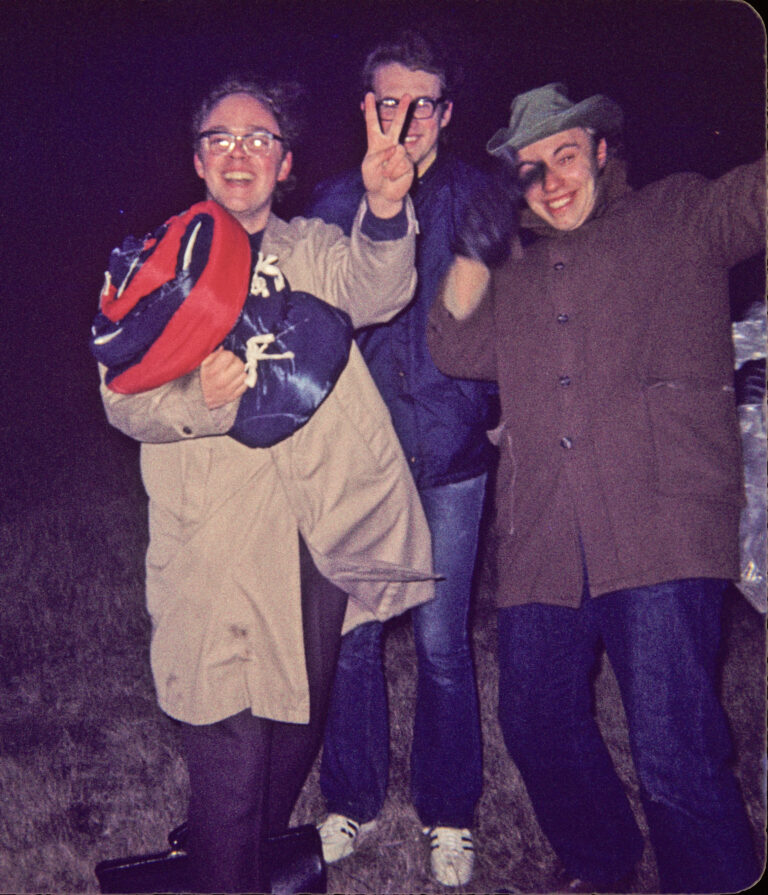
Photographer • Tim Schiller.
First Winks Contacts
At last they arrived. Ther[e] was no difficulty in recognising them as they emerged from Customs. Jim Marlin, who met Alan on a previous visit to this country, was in the squad, and even mistaking the small practice mats which they carried, they had that unmistakeable air of being tiddlywinks players about them (some call it insanity). Some of the Americans expressed surprise when they saw Alan. After reading an article about him on the front page of their national journal, Newswink (entitled "Jim Marlin: The Search for the Supreme Dean (part 1)" they seemed to be expecting a blond-haired, seven foot tall he-man! [...]
Alan now has to rush back to Southampton to play against Belfast. [...] Bill Renke and Jim Marlin went with them too, neither of them can be described as small and the total weight was something quite unknown to Alan's Mini. The rest of the MIT team followed by train. [...]
Friendly matches were in progress between the Soton and MIT players and we began to realise that they were about the same standard as ourselves, something we had not really expected. [...]
Alan Dean, in Winking World 21, October 1972, page 15
Queen's University of Belfast vs. MIT • 26 March 1972
- Date • Sunday, 26 March 1972
- Venue • Southampton University, Southampton, England
- Final match score • MIT 82–30 Belfast
- Number of games played • 16
The next day at 4.00 pm MIT played their first match of the tour, against the Queens Belfast team. David Boyd again played solo, and showed himself to be in a class above the rest of his team. His results compare very favorable with those of the American players, considering how much stronger were his opponents than theirs.
Queens Belfast v MIT
Southampton University 26/3/72
Belfast
1. Ray Cashell, Paul McAllister 1 1 1 1 4 2, Diarmaid Hanna, Malcolm Frazer 1 1 1½ 1 4½ 3. Paul Anthony, Gerry Ennis 1 3½ 0 1 5½ David Boyd (solo) 6 3 1 6 16 MIT
1. Tim, J. Christ 6 6 6 1 19 2. Bill, Jim 6 6 3½ 4 19½ 3. Moishe, Pete 6 5½ 7 6 24½ 4. Craig, Dave 6 6 6 1 19 Total: Belfast 30, MIT 82
Alan Dean, in Winking World 21, October 1972, page 16
Spontaneous Pairs • 26 March 1972
- Date • Sunday, 26 March 1972
- Venue • started in the Postgraduate Common Room and finished in the Catholic Chaplaincy, Southampton University, Southampton, England
- Format • 4 round Swiss
After this match [MIT vs. Belfast], a spontaneous pairs tournament was held with players from MIT, Belfast and Southampton taking part. Most took partners from their own clubs but there were exceptions, notably the Secretaries of NATwA and ETwA who played together. Mick Rooney, the Soton captain[,] teamed up with Craig, and Malcolm Frazer, who played for the Irish but who is actually Scottish and plays for the Soton club, partnered Diarmaid Hanna. A four round Swiss tournament was held with the following result:
1. Schiller, Christ (MIT) 21½ points 2. Dean, Renke (Soton, MIT) 21 3. Goyder, Baker (Soton) 18½ 4. Marlin, Lockwood (MIT) 15½ 5. Seaman, Welch (Soton) 14 Mooney, Schweinhart (Soton, MIT) 14 7. Schwartz, Copper (MIT) 13½ 8. Cashell, Boyd (Belfast) 12½ 9. Mach, MacDonald-Smith 12 10. Frazer, Hanna (Soton, Belfast) 10 11. Anthony, McAllister (Belfast) 9½ Alan Dean, in Winking World 21, October 1972, page 16
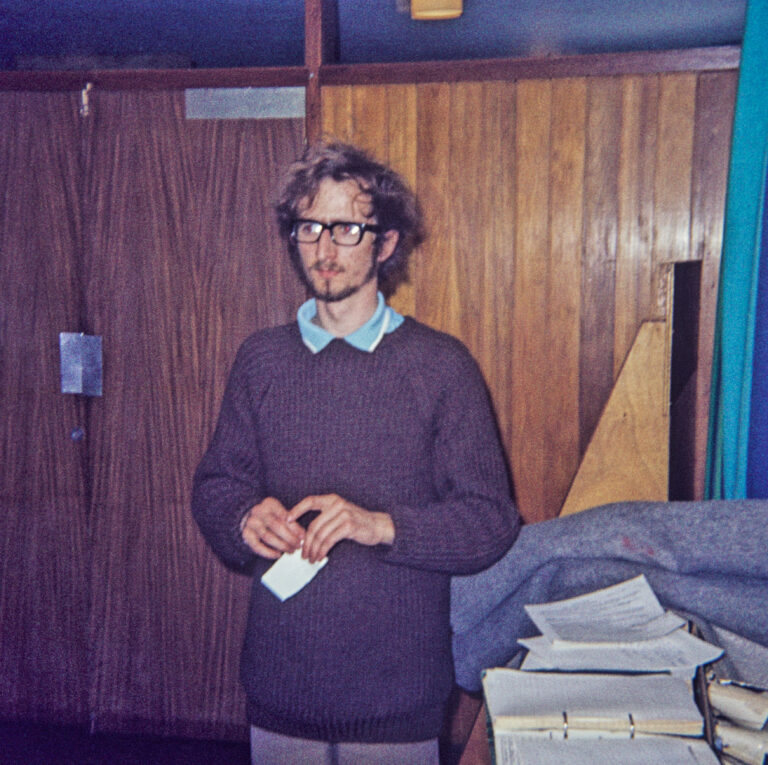
Photographer • Tim Schiller.
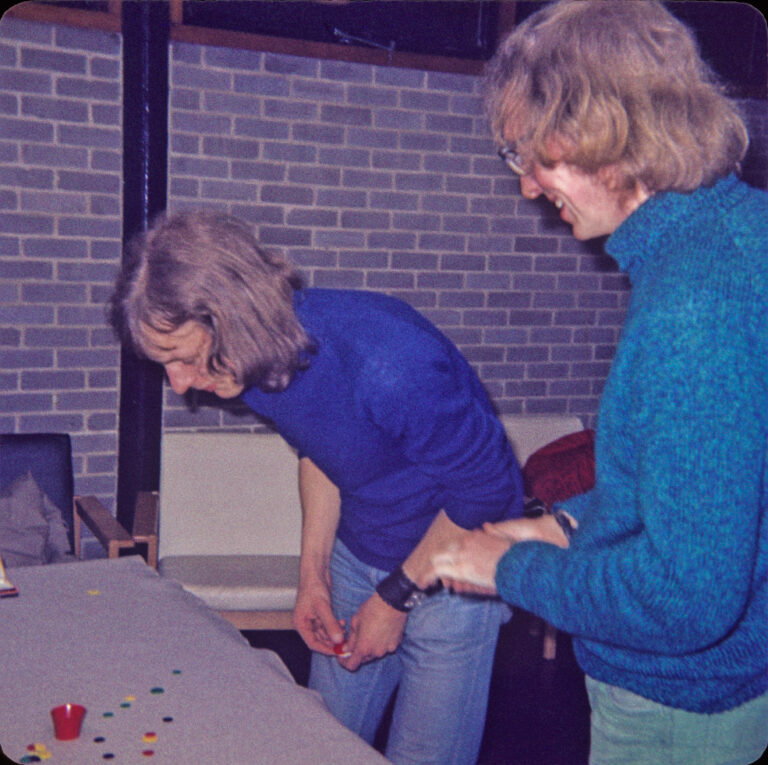
Photographer • Tim Schiller.
Middlesex vs. MIT • London • Monday 27 March 1972, evening
- Date • Monday, 27 March 1972, evening
- Venue • University of London Union, London, England
- Final match score • MIT 60–24 Middlesex
- Number of games played • 12
Early on Monday morning, the MIT team left for London by train to spend the day sightseeing before their next match that evening against Middlesex at the University of London Union. [...]
Middlesex v MIT
ULU 27/3/72
Middlesex
1. Hugh Goyder, Keith Seaman 1 – 5½ 4 10½ 2, Paul Lakra, Linda Cotton 2½ 1 – 2 5½ 3. Roger Kirby, Dave Warman 1 3 1 – 5 4. Christine and Barry Powell – 1 1 1 3 MIT
1. Tim and Christ 6 4½ 6 – 16½ 2. Bill and Jim – 6 4 6 16 3. Moishe and Pete 1½ – 6 6 13½ 4. Craig and Dave 3 5 – 6 14 Final score: Middlesex 24, MIT 60
Alan Dean, in Winking World 21, October 1972, page 17
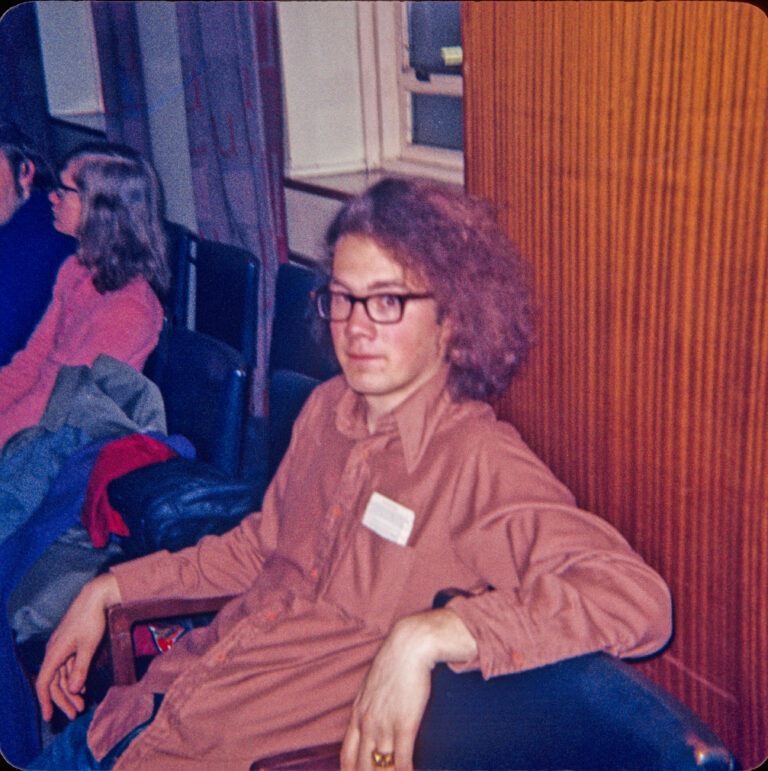
Jim Marlin (center) with Bill Renke and Craig Schweinhart (at left).
Photographer • Tim Schiller.
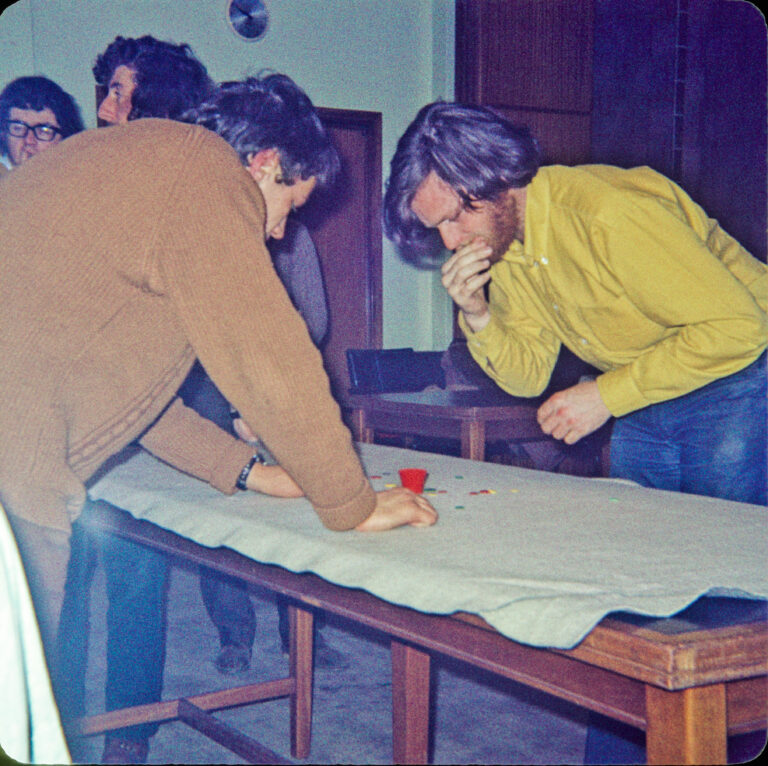
Dave and Ray.
Photographer • Tim Schiller.
Southampton vs. MIT (day 1) • 28 March 1972
- Date • Tuesday, 28 March 1972
- Venue • started in the Postgraduate Common Room and finished in the Catholic Chaplaincy, Southampton University, Southampton, England
- First day score • MIT 65–47
- Number of games played • 16
#OnThisDay in 1972 the first ever World Tiddlywinks Championships took place. Southampton University took on the Massachusetts Institute of Technology and both teams took the game very seriously… Have a punt at who you think won! pic.twitter.com/KDwdLZmTo7
— BBC Archive (@BBCArchive) March 28, 2022
Tuesday March 28th saw the start of the match for the club championship of the world. It had been agreed by the captains, Tim and Alan, that a double length match should be played, The same eight were to play for each team in both halves of the match—no great hardship to the Americans, who had no reserves with them but pairings could be changed, if desired, for the second half of the match. The MIT team were unlikely to alter their well established pairings, which had been together for several years, but this was certainly not true of the Soton team. In the Soton team were two 'veterans', Dean and Seaman and four second years. Two freshers with only six months playing experience made up the eight. These were Steve Welch and the attractive Edna Chivers, the only female to make either team.
The postgraduate common room was a hive of activity before the match. BBC TV cameras were being assembled, Radio Solent and. the press were also present and the players were warming up on the mats. Notable among the audience and the only supporter for the MIT team was Rosie Wain, well known and very· popular in American winking circles, She has now returned to the country of her birth where she is teaching in Nottingham. Mary Timmins, the first reserve for Soton and Christine Jones, the well known mascot and cause, directly or indirectly of so many letters to Winking World were also present.,
Tim Schiller and Alan Dean recorded TV interviews, and the match finally got under way at about 2.30pm. All the games were played to the Ame·rican 25 minute time limit. Southampton got away to a good start, winning the first two rounds 16½–11½ and 17–11, but things started to go for MIT after that. The third round score was a convincing 21–7 in favour of the Americans. The match, which had gone on much longer than expected, had to be disruptd at this stage so that some of the players could dash across to the Southern TV studios to make a live broadcast which had been promised earlier, thinking the match would be finished by then. There were mixed feelings about this. Some players did not like the idea of breaking their concentration at such a vital stage of the match. The Soton captain, who was untypically playing a poor match decided to turn clown the chance of possible TV fame so that he could stay with his troops. Instead, Franz Frans Christ went along with Tim and Alan.
It was quite a dash to the studio and they arrived only minutes before they were due on the air. Alan was interviewed, and talked about winks in general and the World Championship match in particular, whilst the two Americans played a demonstration game of winks in the foreground, The reward for this effort was £3 each plus £2 travelling expenses, and the three decided· that the money should be given to the winning team to put towards a World Championship Trophy.
When the match resumed, the result was even more disastrous for the home side. MIT took the round by 21½-6½, giving them a very satisfactory 65-47 lead in the match at the half way stage; The Soton pairings, which had been changed in the last minutes before the start for personal reasons had certainly not paid off. The 15 points of Alan and Mick hardly justified the pairing of two of the last four in the English Championship, and the scores of the last two pairs were disappointing, particularly Keith and Steve. The scores:
World Club Championship—First Leg
Southampton University v MIT
Soton 28/3/72
Southampton
1. Dave Baker, Julius Mach 6 1 6 2 15 2, Alan Dean, Mick Mooney 1 6 2 6 15 3. Keith Seaman, Steve Welch 4 2 2 2 10 4. Edna Chivers, Hugh Goyder 1 1 2½ 2½ 7 MIT
1. Tim, Christ 1 6 3 8 16 2. Bill, Jim 6 1 5 6 18 3. Moishe, Pete 1 5 5 4½ 15½ 4. Craig, Dave 5 1 5 4½ 15½ Total: Soton 47, MIT 65
Alan Dean, in Winking World 21, October 1972, page 17
How well they "squidge their winks", "squop", and "pot out" will decide today whether Southampton University's Winker's Club are the first world tiddlywinks champions.
Yesterday the club, already the English champions, started their greatest match, against the champions of North America, from the Massachusetts Institute of Technology.
The two teams of eight winkers had fought warm-up matches against Ireland and Middlesex at the university over the weekend.
The American students, who are spending 1,800 dollars for a nine-day tour of the country, were lucky to arrive in Britain. [...]
The International Federation of Tiddlywinks Associations has recognized that this is the first world championship.
Southern Evening Echo, Southampton, England, 29 March 1972, page 15 Tweet
South of England vs. MIT • Tuesday 28 March 1972
- Date • Tuesday, 28 March 1972
- Venue • started in the Postgraduate Common Room and finished in the Catholic Chaplaincy, Southampton University, Southampton, England
- Final match score • MIT 61–51 South of England
- Number of games played • 16
After a short pause for breath, food and other trivia, the all conquering MIT squad started another match, this time against a team representing the South of England. This too went over the allotted time and had to be finished in the Catholic Chaplaincy. A fine display was given by Tim and Franz Frans], who scored 22 points, and led their team to a victory by 61-51.
South of England v MIT
Soton 28/3/72
South of England
1. Mick Mooney (Ilford), Steve Grant (Sidcup) 0 1 6 4½ 11½ 2, Keith Seaman (Harrow), Jeremy Shepherd (London) 1 5 6 6 18 3. David Rose (Dereham), Jon Mapley (Meopham) 2 3 1 6 12 4. Ray Mears (Aldershot), Bungy Wells (Fareham) 3 1 4 1½ 9½ MIT
1. Tim, Christ 7 6 5 4 22 2. Bill, Jim 6 2 4 6 18 3. Moishe, Pete 1 1 6 3 11 4. Craig, Dave 2½ 1 1 5½ 10 Total: South of England 51, MIT 61.
Alan Dean, in Winking World 21, October 1972, page 18
Southampton vs. MIT (day 2) • Wednesday 29 March 1972, evening
- Date • Thursday, 30 March 1972, evening
- Venue • Manchester University Union, Manchester, England
- Second day score • MIT 58–54 Southampton
- Final match score • MIT 123–101 Southampton
- Number of games played • 32
The Southampton team was completely reshuffled before the second leg of the World Championship match, which was played on the [sic duplicate: on the] Wednesday evening. MIT kept their team exactly the same, as they had done in every match of the tour so far. Mick was still off form and produced another low score, this time with Steve. Keith and Edna produced a useful 16, beating Alan and Julius for top score in the team, but we must remember that Julius had been up all the previous night playing bridge with the MIT squad. The match was hard and fierce but the strength of the MIT team was sufficient to carry them through. In fact the Americans were able to increase their lead slightly, to emerge as the worthy winners of the first ever \World Championship match.
World Championship—Second Leg.
Southampton
1. Hugh, Dave 3 1 6 3 13 2, Alan, Julius 1½ 4 4 5 14½ 3. Keith, Edna 5½ 3 3 4½ 16 4. Mick, Steve 1 1 6 2½ 10½ MIT
1. Tim, Christ 4 5½ 1½ 6 18 2. Bill, Jim 6 3 4 6 19 3. Moishe, Pete 1 3 4 1 9 4. Craig, Dave 4 2 2½ 4½ 13 Total: Southampton 54, MIT 58
Two leg total: Soton 101, MIT 123
After the match the Southampton players adjourned to a local hostelry with the Americans to help them celebrate their victory.
Alan Dean, in Winking World 21, October 1972, page 18
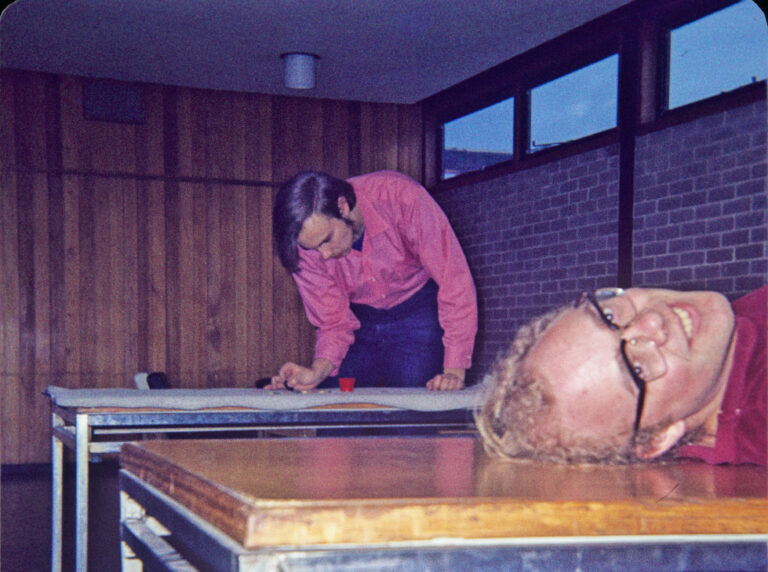
Bill Renke winking at rear, with Frans Christ clowning on the table.
Photographer • Tim Schiller.
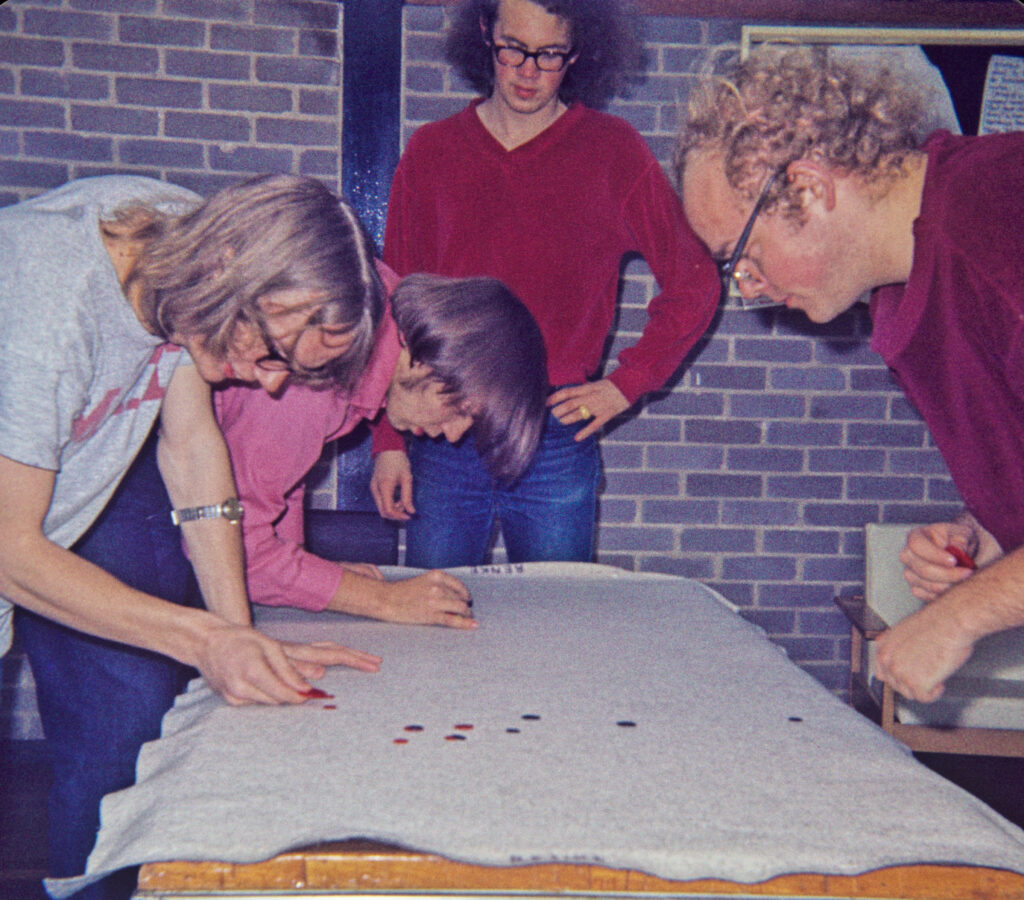
Left to right: Dave Lockwood, Bill Renke, Jim Marlin, Frans Christ.
Photographer • Tim Schiller.
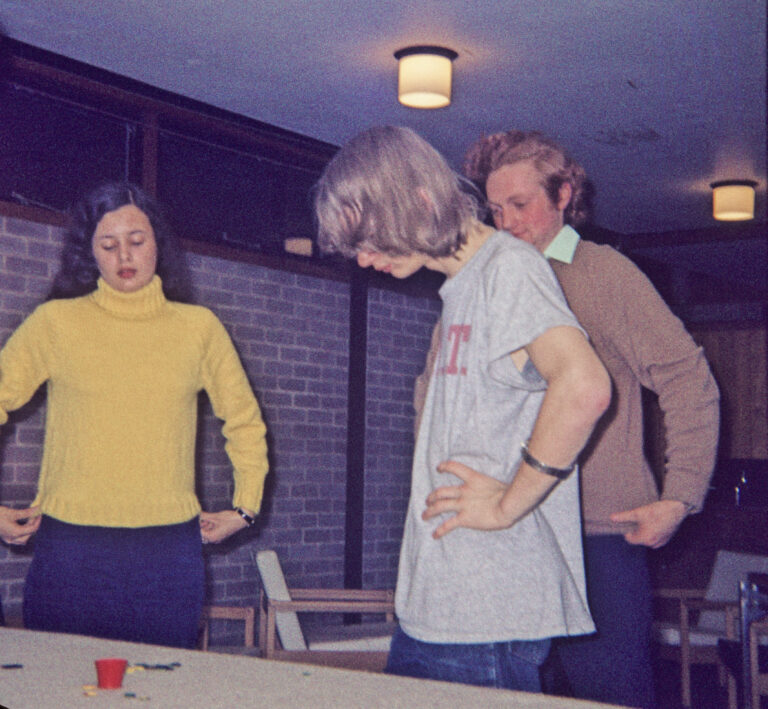
Edna Chivers (Southampton), Dave Lockwood (MIT), Hugh Goyder (Southampton).
Photographer • Tim Schiller.
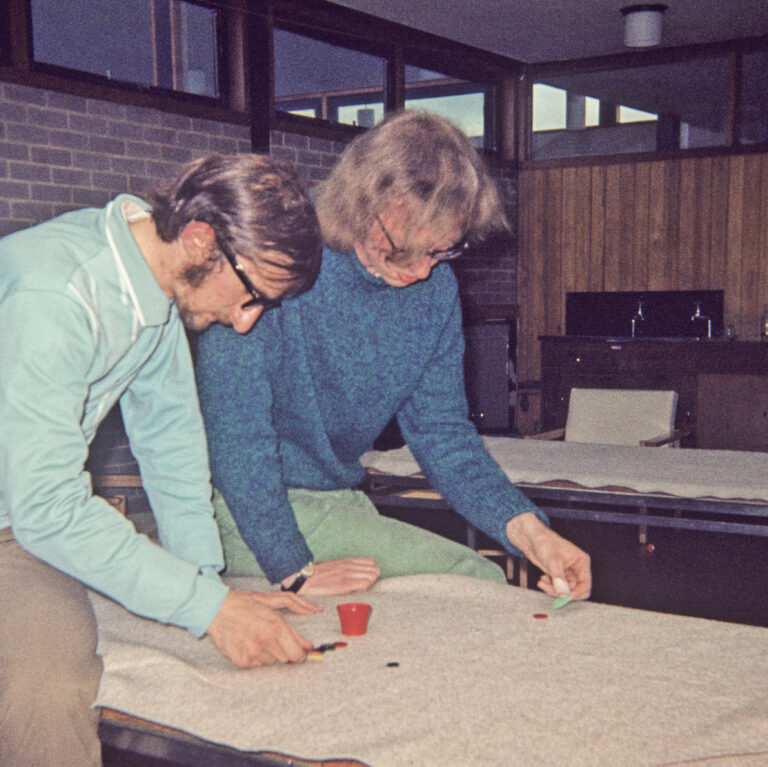
Left to right: Alan Dean (Supremo) and Dave Baker of the Southampton team.
Photographer • Tim Schiller.
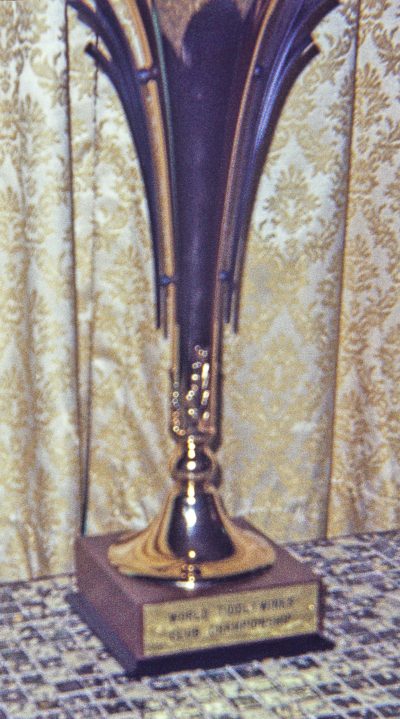
The World Tiddlywinks Club Championship trophy, purchased by the MIT team with funds from a TV interview in England.
Photographer • Tim Schiller.
SOUTHAMPTON, Eng.—An American team squiggled and squopped their way to victory in the first world tiddlywinks championship here Thursday.
The North American champions, from the Massachusetts Institute of Technology, played two four-hour matches against the English champions from Southampton University.
After winning both matches, the American captain, Tim Schiller, 21, said: "The English were better technically—but our strategy was superior."
The English captain, Julius Mach, 20, said, "We are just not used to the American big-time experience."
Los Angeles Times, 31 March 1972, Part I, page 4.
MIT's eight-man tiddlywinks team returned Monday from England as world champions after defeating Southampton University, the British champions, by a score of 123 to 101.
On March 28th and 29th the MIT and Southampton teams played two rounds of the championship match and MIT won both—65–47 and 58–54—making the total score of 123–101 for their world championship victory [...]
The team captain, Timothy R. Schiller, Fresno, California, a civil engineering senior, believes that the Southampton team members are actually more skilled at the game than are the MIT members. But he explains the MIT victory by noting that the MIT team members have developed better strategy—more than compensating for their lesser skills in handling the plastic disks.
Tech Talk (official MIT newspaper), 5 April 1972.
North of England vs. MIT • 30–31 March 1972
- Date • Thursday, 30 March 1972, evening, and 31 March 1972
- Venue • Jon and Sue Harman’s flat, Manchester, England
- Final match score • North of England 61–51 MIT, MIT’s only loss on the tour
- Number of games played • 16
The next match of the tour was against a team representing the North of England, and was to be played at Manchester University Union the following evening. To transport the M.I.T. team, and all their luggage; a minibus was hired, and a free chauffeur was found, in the E.Tw.A. Secretary. The party was well behind schedule in getting under way on Thursday morning,. Alan Dean was not out of bed quite as early as he should have been to collect the minibus, and, as the largest thing he had previously driven was his Mini, he felt a short drive around Southampton would be a good idea, to get the feel of the bus, before risking the lives of the M.I.T. players. When the Americans were finally collected it was found that there was not enough room in the van for all of them and their luggage so another trip into the town centre had to be made to buy rope to tie some of the bags on the roof rack. All this took time, and when it was discovered that the bus did not have the power to take its enormous load at much above 50 m.p.h. it became clear that reaching Manchester in time for the proposed 7.30 squidge-off was just not on, To make it absolutely certain, Alan took a wrong turning which took them through Birmingham, instead of round it, so a phone message was sent on to warn of the expected very late arrival.
It was almost 10 p.m. when the happy throng finally steamed into Manchester amid the traditional pouring rain. The opponents were waiting on the steps of the Union building. It was too late to start a match there, and one of the North of England players, Dave Beaman. of Manchester Grammar, had left as he was unable to stay long enough to finish the match. John Harman suggested that the match be played at his flat, to which everyone then adjourned. The problem of the missing player was easily solved,. Alan Dean, now playing the part of the Captain pf the North of England, still had an ace to play. In his minibus, in case of emergencies, he was carrying a spare, Jeremy Shepherd, which he now used to fill the hole. This did not entirely please the Americans, as Jeremy had played very well for the South, and was considered by some of them as the best English player they had seen.
By 11 p.m the first squidges of the match were being made, All the games were being played on the floor, and the usual 1, 2, 3, 4 numbering of the mats had been given up in favour of lounge, bedroom, kitchen, hall. The first round went to the North of England by a comfortable 18½–9½. In the second, Alan Dean and Phil Tepper came up against Tim Schiller and Franz Frans Christ. The Americans had been squopped up when during free turns one of Tim's winks was freed, leaving it on a critical pile. Alan, who played before Tim, tried to crud Tim's wink off the pile to prevent him from desquopping. In the event, Alan not only knocked the wink off, but also squopped. it. He then moved his wink aside to allow Tim to play. Tim, however, insisted that he should decide which of Alan's winks be moved aside, and a fairly lengthy discussion ensued. The Rules were of no help. They simply say,, "A sguopped pair whose wink or winks have thus been freed, must be allowed at least one shot. taken by the opponent next in turn before being squopped.again." Nothing in the Rules explains what action should be taken if the previous rule is broken. The two National Secretaries had held a long discussion before the start of the tour, to try to reach mutual agreement on legal shots, and ambiguities in the Rules; but this one had not been raised. Eventually the difference was resolved. It was agreed to Take take Tim's interpretation of the Rules, but Alan was allowed to take the shot again as it had been played in good faith. For the record, Alan attempted the same shot again, missed it by inches, and his play for the remainder of the game was largely responsible for the defeat of Phil and himself by 6–1.
No-One seems to remember much more about that match, except that it ended at about 3.30 a.m, and. the North of England won 61–51, to break at last the unbeaten record of the powerful American team. The scorecard for the' match is given below:
North of England v M.I.T.
Played at John and Sue Harman[']s flat, M/c on 301-/3/72
North of England
1. John Harman and Nigel Knowles 2 6 1½ 3 12½ 2, Jeremy Shepherd and John Ormiston 2 4½ 3 5 14½ 3. Alan Dean and Phil Tepper 1 6 6 3 16 4. Alan Bolton and Simon Gould 6 5 1 6 18 MIT
1. Tim, Christ 5 5 6 1 17 2. Bill, Jim 1 2½ 1 2 6½ 3. Moishe, Pete 5½ 4 1 6 16½ 4. Craig, Dave 4 2 4 1 11 Total: North of England 61, MIT 51
Some of the Americans slept at the Harman's flat, and the rest at Alan Dean's parents place.
Alan Dean, in Winking World 21, October 1972, pages 19 and 20
Altrincham Grammar School vs. MIT • 31 March 1972
- Date • Friday, 31 March 1972
- Venue • Altrincham, England
- Final match score • MIT 63½–20½ Altrincham Grammar School
- Number of games played • 12
Next day which was Good Friday, a match was played against tlie Altrincham Grammar School side, the team who which had produced the top scoring pair in the previous match. MIT, however, made no mistake about it this time, and won their last match in convincing style. The Scorecard speaks for itself:
Alan Dean, in Winking World 21, October 1972, page 20
The scorecard in Winking World 21 has no winker names nor scores..
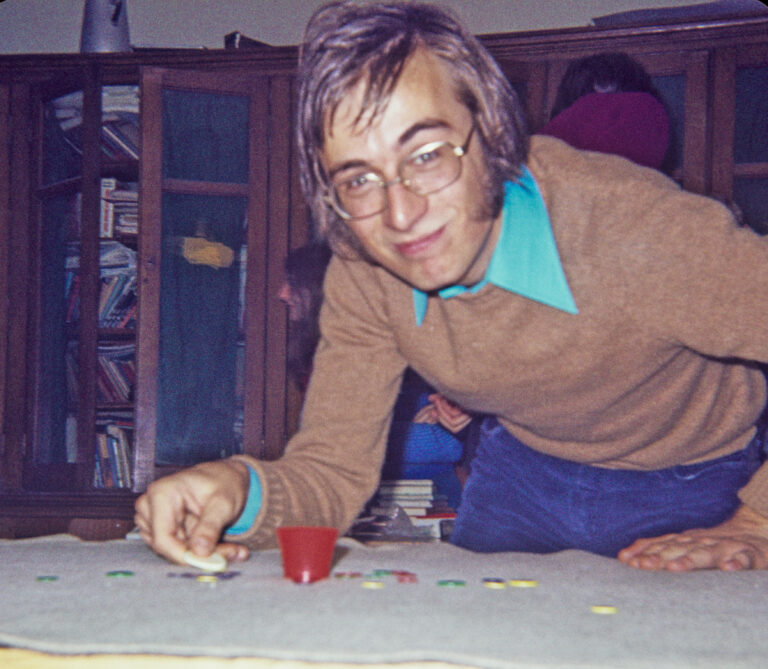
Peter Bryan.
Photographer • Tim Schiller.
Final Days and Random Winking
After this match, Tim Schiller went to catch an overnight train to Edinburgh (there is no truth in the rumour that the rest of his team had a whip round to persuade him to go) and Alan drove the rest of the MIT squad to London. The overnight stay was at the home of Keith Seaman's parents, which was reached just before 1 am, just in time for a quick game of winks before breakfast. It started when Alan challenged Bill to a singles match (for the National Tw. Associations Secretary's Singles· Championships of the World?). Bill accepted and was duly beaten 11–3, but then Craig and Dave joined in and the play just went on ... and on. At 5.45am Alan finally put down his squidger and took Franz Frans to Heathrow Airport, where he caught a flight to Amsterdam to visit relatives. Alan proceeded to Southampton to return the minibus to the.garage before it opened on Saturday morning, only to discover that one of the MIT. crew had left all his money under one of the seats. A brisk walk across the Common brought Alan to Khartoum Road by 7.30 where the household was just rising and were.a little confused about whether he was coming or going. In fact he was doing both. After a quick breakfast he jumped. into his car, and was back in London before the Americans were awake. Shotly Shortly after his return, three more were found to make· a four for winks!
In the afternoon, the Americans went sight seeing in London, and Rog Kirby came round to give Alan and Keith a game of winks. The Americans spent two more nights in London, before going to Heathrow on Monday morning where they met Tim and (we hope) Franz Frans and caught their plane home.
Alan Dean, in Winking World 21, October 1972, page 20
Reflecting on the Tour
There is no doubt that the tour was an enormous success. For MIT there was the thrill, not just of coming here (on MIT funds) but also of beating some of the best teams England could offer. It was·perhaps a pity that it all had to happen during the university vacations, and so near to Easter, but this was unavoidable as the Americans had to come during their own vacation, This and the incredibly short notice of it all, meant that some clubs who would otherwise have wanted to play against the American champions· were unable to do so. Even so, enough clubs were found to keep MIT busy, and at least the ETWA Secretary was spared the job of having to tell some clubs that they could not be fitted into the tour schedule through lack of time.
For us there was the pleasing discovery that intelligent life does exist outside the British Isles. Most of us had vainly thought that the Americans would not be up to the high tactical standards of some of our players, since they had fewer players and a much shorter history of playing winks than we have. It turned out that their game was much closer to ours than even that of the Irish. In America, thankfully, the established colour order is the alphabetical one used here, which really should find its way into the rules.
The tour proved useful in pinpointing some bf the inadequacies of the International Rules, one example of which has already been given. Bill and Alan took advantage of the two long minibus journeys for a lengthy discussion on this subject, and a number of suggested improvements came out, which will be put before the next Congress, An excellent innovation, which NATWA has had for some time, and could well be introduced here concerns the use of umpires to judge if a wink is squopped or not. The present tendency is to ask someone and, if the person losing the decision does not agree, he may ask for a second opinion. This may go the other way, and then things may start to get out of hand. The American solution to this problem is to allow the first umpire three possible choices: "yes", "no" or "don't know", and only in the event of a "don't know" is a second verdict permitted.
Possibly the only significant difference in tactics between the top English and American players is the greater tendency among Americans to shoot squopped enemy winks well away from the field of play, "boondocking;' as they call it, This is probably partly due to the fact that they do not have our skill at delicately manoevring piles, but it could also be that we had underestimated the advantage of immediately obtaining one or two free winks in a vital area, even at the cost of losing an enemy wink. One of the reasons for our ability to play the delicate shots of the game must be the use of the superb "Southampton Squidger" which more and more of our best players are using. Keith Seaman delevoped the technique for making this squidger in the metalwork shop at Ealing Grammar School, and he and Mick Mooney perfected it at Soton.
A number of these squidgers were taken back to America by the MIT players. Finally, a few words about the individuals who made up the MIT team. They proved to .be excellent ambassadors for their country, and for NATWA, making· friends wherever they went, and it will be a long time before their visit is forgotten by those who had the pleasure of meeting them, on or off the mat.
Alan Dean, in Winking World 21, October 1972, page 20–21
Postmatch Publicity
SOUTHAMPTON, England (UPI)—Tough fiddling sparked by senior Timothy Schiller of Fresno, Calif., led the Massachusetts Institute of Technology to a 122 123–101 upset tiddlywinks victory over defending champion University of Southampton.
A spokesman for MIT, who announced the victory here, said that he wasn't sure how one played the game, but, "It has something to do with potting those little things in the cup." He added it is the first time an American team has won the title.
3 April 1972, Springfield Union, article "Happy Tid-Bits", page 22, column 2.
On Wednesday, March 29th, the first world Tiddlywinks championship was won by the American upstarts as Bill Renke '73, made a difficult pot from just below the rim of the cup to clinch MIT's victory over Southhampton University, the European champions. The final score of the match, which took place in Southhampton, a middle-sized city on England's southern coast, was 123-101.
The top pair for MIT was Renke and Jim Marlin '73, who scored 37 points, followed by Tim Schiller '72 and J. Christ '73 with 33, Craig Schweinhart '73 and Dave Lockwood '74 with 28½, and Moishe '72 and Pete Cooper Copper '75 with 24½. Southhampton jumped off to an early 33½–22½ lead, but the MIT winkers showed their poise by coming back to win. Both English television stations (BBC & ITV) covered the tournament on their news shows.
The North American champions had previously defeated Queen's University of Belfast, Northern Ireland, by 82–30, a club team from Middlesex, England, by 60–24, the Southern England All-Star Team by 61–51, and Altrincham Grammar School by 63½–20½ in exhibition matches while touring England to create publicity for and interest in the game. Their sole loss came at the hands of the Northern All-Star Team by a score of 61–51. [...]
The match with Southhampton was the first one ever sanctioned by the International Federation of Tiddlywinks Associations as a "world Championship."
25 April 1972, The Tech (MIT student newspaper), article by Fred Shapiro, "MIT's World Champions", page 7, column 3. Tweet
![[+template:(Tucker Tw ID • [+xmp:title+] — publisher • [+iptc:source+] — title • [+xmp:headline])+]](https://tiddlywinks.org/wp-content/uploads/2022/09/1972-04-03-Dave-Lockwood-Frans-Christ-Bill-Renke-Tim-Schiller-Jim-Marlin-and-Craig-Schweinhart-at-Logan-Airport-Boston-MA-from-MIT-Museum-item-5658-copy.jpeg)
Left to right: Dave Lockwood, Frans Christ, Tim Schiller, Jim Marlin, Craig Schweinhart.
Photographer • Margo Foote of the MIT News Office. Source • MIT Museum.
A similar photograph appeared in the 4 April 1972 Boston Globe, page 3, column 4, taken by William Curtis.
And in spite of a minor setback when we came out second best in a widely publicized Ping-Pong test in Communist China, we can now point with pride to the fact that in a hard-fought Tiddlywinks contest in Great Britain, athletes from the United States recently won the first world Tiddlywinks championship.
So we lose some and we win some. Our Ping-Pong diplomacy may need a few secret workouts to bring it back to par, but at Tiddlywinks diplomacy we now are second to none.
25 April 1972 • Pomona Bulletin (Pomona, California), page B-2, column 6.